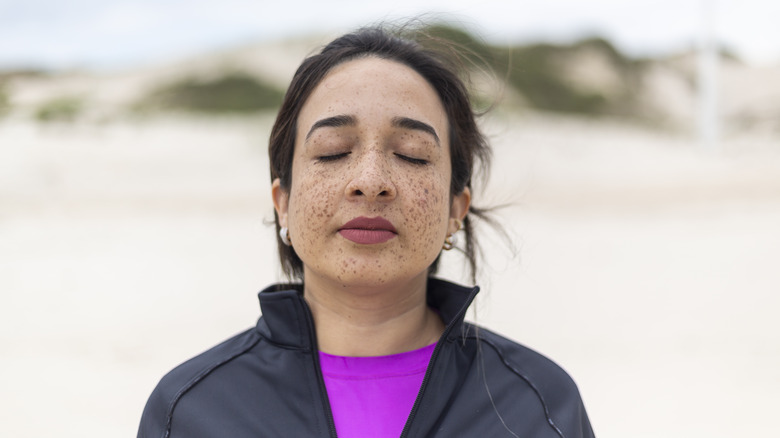How A Simple Sigh Can Be Key To Alleviating All That Anxiety
When we experience panic, usually someone tells us, "Just breathe." That's because in times of stress, our breathing becomes rapid and our heart rate increases as our sympathetic nervous system kicks in, according to a 2023 review in Brain Sciences. Paying conscious attention to taking a deeper breath can help us calm down, but it's actually the exhale that works the magic in relieving our anxiety and stress. That longer exhale helps activate the parasympathetic nervous system — our "rest and digest" system — to slow down our heart rate and calm our minds. Therefore, rather than telling ourselves to "Just breathe," it's probably better to let out a nice, long sigh.
A 2023 article in Cell Reports Medicine put the sigh to the test, comparing it to other breath practices and mindfulness meditation. For a month, four groups practiced either one of the breath practices or mindfulness meditation for about five minutes a day.
Mindfulness meditation and breath practices improve mood and reduce anxiety
In the study comparing sighing, breathwork, and mindfulness meditation, the sighing group — who performed something called cyclic sighing — was told to inhale through the nose slowly, then inhale a little more to fill the lungs, then sigh out through the mouth. The box breathing group inhaled for a specific number of seconds, held the breath for that same duration, exhaled the same duration, and then held the breath for an equal duration. The cyclic hyperventilation group was instructed to breathe in deep through the nose then allow the air to fall out of the mouth and repeat 30 times. After the 30th breath, they paused at the end of the exhale for 15 seconds, then resumed the 30-breath set for two more rounds. The mindfulness meditation group focused on a point on their forehead between their eyebrows for five minutes.
After each breath practice or mindfulness meditation, participants felt that their positive feelings improved and their negative emotions had reduced. They also felt less anxious after their five-minute practices. The three groups that practiced breathwork had reduced their respiratory rate more than the mindfulness group.
What's more, the sighing group had better improvements in feeling positive over the month-long practice. In other words, as that group practiced their cycling sighing each day, their positive emotions continued to increase. This wasn't the case with the other breath practice groups or the mindfulness group.
Breath practices can improve mental health
Evidence for the benefits of breathing practices isn't new. Different breathing styles have been found to be effective for different needs. If you're not familiar with bhramari breath, it also emphasizes a long exhale but you cover your ears, close your mouth, and hum. A 2022 study in the Journal of Ayurveda and Integrative Medicine investigated the effect of bhramari breath on COVID-19 and other hospital patients. The patients practiced bhramari breathing for one minute followed by two minutes of regular breathing and continued this practice for 20 minutes twice a day. After two weeks, the patients reduced their stress, anxiety, and depression while improving their quality of sleep.
Breath practices have been studied among people diagnosed with clinical anxiety. The 2023 review in Brain Sciences collected the results for 16 studies and found that breath practices significantly improved patient outcomes, but some results contradicted other studies. Sudarshan kriya yoga (SKY), which combines several different breath practices in one sitting, has been found to ease anxiety. Diaphragmatic breathing was most consistent in reducing stress levels in the general population and can improve symptoms for people diagnosed with anxiety.



